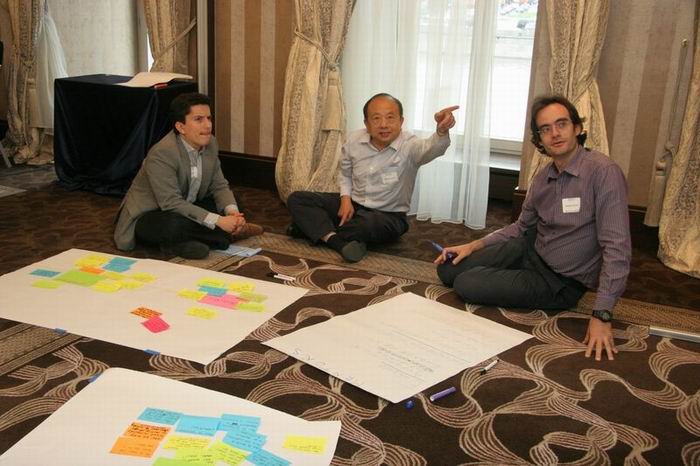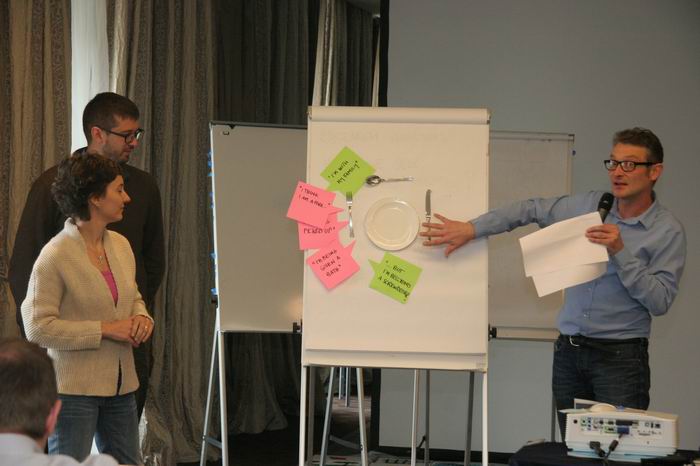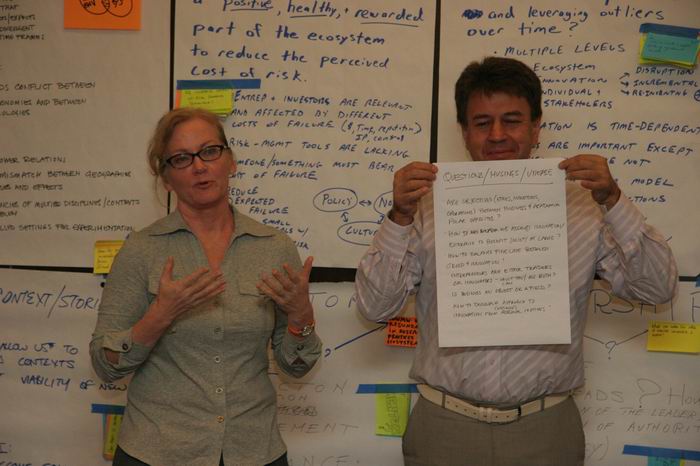Innovative process delivers radically innovative research
From September 23 to 27 in Moscow, Skoltech and the MIT Skoltech Initiative hosted the first ever “Ideas Lab” workshop in Russia. The grand challenge of the workshop was to generate multidisciplinary collaborative research projects to study: How can an institution (such as a university or a governmental agency) seed, grow and maximize technological innovation and entrepreneurship?
An “Ideas Lab” is an intensive interactive workshop designed to produce radically innovative research proposals. Participants from diverse backgrounds and disciplines come together in a creative, free-thinking environment, away from their daily routines and distractions, and immerse themselves in a collaborative process to develop fresh approaches to an important challenge.
 The Skoltech Ideas Lab was a 5-day residential program with 24 participants from leading institutions and organizations in 17 countries, drawn from different scientific disciplines and cultural backgrounds. The participants worked together to deepen their shared understanding of the challenge, to define the problems within the challenge, and to generate novel ideas for research proposals. The outcome of the workshop is multi-disciplinary research that’s risky and cutting edge, and that would be unlikely to get funded through a standard procedure of research funding.
The Skoltech Ideas Lab was a 5-day residential program with 24 participants from leading institutions and organizations in 17 countries, drawn from different scientific disciplines and cultural backgrounds. The participants worked together to deepen their shared understanding of the challenge, to define the problems within the challenge, and to generate novel ideas for research proposals. The outcome of the workshop is multi-disciplinary research that’s risky and cutting edge, and that would be unlikely to get funded through a standard procedure of research funding.
The Ideas Lab event was facilitated by Knowinnovation, a consulting company which was one of the authors of the Ideas Lab methodology. The outcome of the workshop is multi-disciplinary research proposals that are risky and cutting edge; they would be unlikely to get funded through standard research calls
The review committee, headed by Skoltech President Edward Crawley, selected two proposals on the basis of their novelty, feasibility and relevance to both Russian and international contexts:
Rapid Design Pivot
There is unrealized potential in many new technology products, but so far, an efficient way to uncover this potential has not been discovered. By introducing and establishing a Rapid Design Pivot at Skoltech early in the process of developing tech products, developers will be able to discover diverse and multiple uses and markets for their products much more efficiently. Through a novel colloborative process it will become possible to reduce the time spent searching for potential markets, creating savings in both time and money. The idea is to simultaneously explore multiple applications of the same technology, increase value creation of existing tech products, maximize innovative outcomes, and reduce time to market.
 Thing Tank addresses the question: How can we mine our material interactions with things to seed and produce new cycles of innovation? The research proposal explores the practical use and reuse of objects as an untapped potential for innovation. The proposed platform called Thing Tank at Skoltech will operate at the intersection of machine learning, ubiquitous computing and social interaction design. Things will design things. The project will pioneer the field of thing-centered innovation and will make Skoltech a hub for such innovation processes.
Thing Tank addresses the question: How can we mine our material interactions with things to seed and produce new cycles of innovation? The research proposal explores the practical use and reuse of objects as an untapped potential for innovation. The proposed platform called Thing Tank at Skoltech will operate at the intersection of machine learning, ubiquitous computing and social interaction design. Things will design things. The project will pioneer the field of thing-centered innovation and will make Skoltech a hub for such innovation processes.
Both proposals will be funded and conducted at Skoltech and partner institutions. Check back for updates on the launch of these two international projects, based in Skolkovo.
It is all about people
The Ideas lab process started several months before the workshop itself. An “open call” was issued that resulted in 130 qualified applications, of which Skoltech, MIT and the Knowinnovation team selected 25 participants who best fit the desired goal – to bring together experienced practitioners from diverse academic fields, keenly interested in studying and practicing innovation, to design and then conduct multidisciplinary research projects in entrepreneurship and innovation.
A few weeks prior to the event, the selected participants introduced themselves, shared initial ideas, learned more about the Ideas Lab and discussed the main topic of the event.
 Purposeful, deliberate creativity
Purposeful, deliberate creativity
The Ideas Lab process is a deliberate approach to spur on creative thinking. It’s both hard work and a lot of fun. Various activities helped to introduce participants to each other, facilitate collaboration, and encourage unconventional ideas. These included a number of exercises, group presentations with anonymous feedback, individual “soapbox” speeches to introduce new concepts or to emphasize key points, and lots of sticky notes. There were no random activities; every exercise or activity had a purpose.
This is how the Ideas Lab works: through generation and free exchange of ideas the participants overcome their personal, intellectual and “common-sense” barriers to produce radically different and innovative ideas that evolve into research proposals. The Ideas Lab is a space for listening and exploring.” to this: “This process of “deliberate creativity” produces a space for listening and exploring in the Ideas Lab.
At the Ideas Lab four “mentors” – from Skoltech, the MIT Skoltech Initiative, University College London, and the Technology Strategy Board in the UK – helped to catalyze creative thinking and stimulate the emergence of exciting ideas by connecting people in the room with each other, and by encouraging the teams to think through their ideas. The structure of the event encouraged the participants to share all their ideas with each other freely. Mentors were not allowed to get involved in any projects that emerged from the Ideas Lab.
In addition to mentors, the Ideas Lab involved four provocateurs – very experienced representatives of the global innovation community, whose objective was to provoke the participants to think about the Innovation Ecosystems in new, non-traditional ways. The provocateurs involved were Bala S. Manian, serial entrepreneur and Chief Executive Officer; Alexander Galitsky, Co-founder and Managing Partner of Almaz Capital Partners; Ruth Graham, an independent consultant hired by the MIT Skoltech Initiative to benchmark innovation ecosystems around the world and past Mechanical Engineering Professor at Imperial College London; and Dr. Dennis Ausiello, Chief of Medicine at the Massachusetts General Hospital and Chief Scientific Officer of Partners Healthcare. The presentations had the desired effect: the participants began to question their initial assumptions and modify their ideas. The presentations raised new questions, which helped participants better understand the landscape of the critical challenge and to look at it in different ways.
In his welcome address, Professor Charles L. Cooney, Robert T. Haslam (1911) Professor of Chemical Engineering, MIT, and MIT Faculty Lead for Innovation, MIT Skoltech Initiative, as well as the Ideas Lab Director, stated the objective for the workshop: ”We all have different views on what innovation really is. I hope by the end of this week we’ll be able to reduce these views to a set of principles that are fundamental to a university, and certainly fundamental to Skoltech where innovation is meant to be integrated into the research and education pathways of the institution.”
Birth of international E&I research community
Two ambitious projects will be funded by Skoltech, and the teams that formed during the Ideas Lab will build a substantial presence at Skoltech during their execution. The Ideas Lab achieved its goal of generating really novel ideas for relevant research at Skoltech.
The Ideas Lab event also helped Skoltech to move far beyond simple academic research proposals. In just one week, Skoltech has launched and built an international community of researchers and practitioners of entrepreneurship and innovation; this is a network of diverse organizations and enthusiastic experts.
“This is a first step. Additional conversations between Skoltech and the Ideas Lab participants and their institutions will be held in the near future. We anticipate very interesting potential collaborations with the members of the network we created together,” said Ilia Dubinsky, Director of the Center of Entrepreneurship and Innovation at Skoltech, in his closing remarks.
